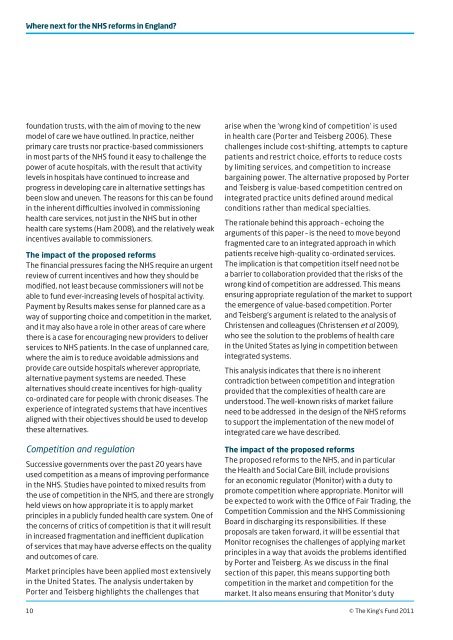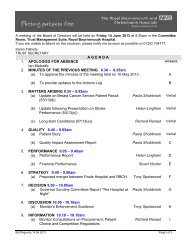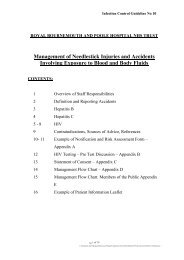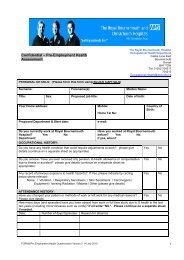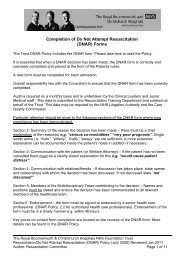View June's Board Pack - Royal Bournemouth Hospital
View June's Board Pack - Royal Bournemouth Hospital
View June's Board Pack - Royal Bournemouth Hospital
- No tags were found...
Create successful ePaper yourself
Turn your PDF publications into a flip-book with our unique Google optimized e-Paper software.
Where next for the NHS reforms in England?foundation trusts, with the aim of moving to the newmodel of care we have outlined. In practice, neitherprimary care trusts nor practice-based commissionersin most parts of the NHS found it easy to challenge thepower of acute hospitals, with the result that activitylevels in hospitals have continued to increase andprogress in developing care in alternative settings hasbeen slow and uneven. The reasons for this can be foundin the inherent difficulties involved in commissioninghealth care services, not just in the NHS but in otherhealth care systems (Ham 2008), and the relatively weakincentives available to commissioners.The impact of the proposed reformsThe financial pressures facing the NHS require an urgentreview of current incentives and how they should bemodified, not least because commissioners will not beable to fund ever-increasing levels of hospital activity.Payment by Results makes sense for planned care as away of supporting choice and competition in the market,and it may also have a role in other areas of care wherethere is a case for encouraging new providers to deliverservices to NHS patients. In the case of unplanned care,where the aim is to reduce avoidable admissions andprovide care outside hospitals wherever appropriate,alternative payment systems are needed. Thesealternatives should create incentives for high-qualityco-ordinated care for people with chronic diseases. Theexperience of integrated systems that have incentivesaligned with their objectives should be used to developthese alternatives.Competition and regulationSuccessive governments over the past 20 years haveused competition as a means of improving performancein the NHS. Studies have pointed to mixed results fromthe use of competition in the NHS, and there are stronglyheld views on how appropriate it is to apply marketprinciples in a publicly funded health care system. One ofthe concerns of critics of competition is that it will resultin increased fragmentation and inefficient duplicationof services that may have adverse effects on the qualityand outcomes of care.Market principles have been applied most extensivelyin the United States. The analysis undertaken byPorter and Teisberg highlights the challenges thatarise when the ‘wrong kind of competition’ is usedin health care (Porter and Teisberg 2006). Thesechallenges include cost-shifting, attempts to capturepatients and restrict choice, efforts to reduce costsby limiting services, and competition to increasebargaining power. The alternative proposed by Porterand Teisberg is value-based competition centred onintegrated practice units defined around medicalconditions rather than medical specialties.The rationale behind this approach – echoing thearguments of this paper – is the need to move beyondfragmented care to an integrated approach in whichpatients receive high-quality co-ordinated services.The implication is that competition itself need not bea barrier to collaboration provided that the risks of thewrong kind of competition are addressed. This meansensuring appropriate regulation of the market to supportthe emergence of value-based competition. Porterand Teisberg’s argument is related to the analysis ofChristensen and colleagues (Christensen et al 2009),who see the solution to the problems of health carein the United States as lying in competition betweenintegrated systems.This analysis indicates that there is no inherentcontradiction between competition and integrationprovided that the complexities of health care areunderstood. The well-known risks of market failureneed to be addressed in the design of the NHS reformsto support the implementation of the new model ofintegrated care we have described.The impact of the proposed reformsThe proposed reforms to the NHS, and in particularthe Health and Social Care Bill, include provisionsfor an economic regulator (Monitor) with a duty topromote competition where appropriate. Monitor willbe expected to work with the Office of Fair Trading, theCompetition Commission and the NHS Commissioning<strong>Board</strong> in discharging its responsibilities. If theseproposals are taken forward, it will be essential thatMonitor recognises the challenges of applying marketprinciples in a way that avoids the problems identifiedby Porter and Teisberg. As we discuss in the finalsection of this paper, this means supporting bothcompetition in the market and competition for themarket. It also means ensuring that Monitor’s duty10 © The King’s Fund 2011


